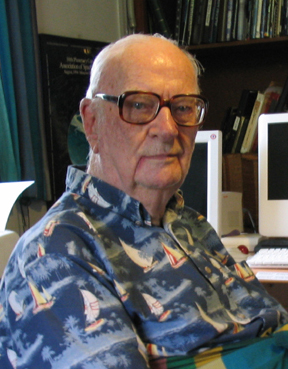Flores, Javier. 10 frases geniales de Arthur C. Clarke. Publicado en Muy Interesante https://www.muyinteresante.es/cultura/arte-cultura/articulo/10-frases-geniales-de-arthur-c-clarke-941387200082 Consultado el 15 de diciembre de 2018
Frases célebres de Arthur C. Clarke
Frabetti, Carlos. Arthur C. Clarke o la razón soñadora. Publicado en Público el 15 de diciembre de 2007 https://www.publico.es/ciencias/arthur-c-clarke-o-razon.html Consultado el 15 de diciembre de 2018
“La magia es solo ciencia que no entendemos aún”
Magic's just science that we don't understand yet
Fuente: Brown, Jordan D. Science Stunts: Fun Feats of Physics. Ilustrado por Anthony Owsley. Edición ilustrada. Editorial Charlesbridge Publishing, 2016. ISBN 9781607349419. Página 6.
Frases de hombres de Arthur C. Clarke
Behind every man now alive stand thirty ghosts, for that is the ratio by which the dead outnumber the living.
2001: una odisea espacial. Arthur C. Clarke. Basado en el guión de Stanley Kubrik y Arthur C. Clarke. 1968. Editorial New American Library, 1968. Página 7, prólogo.
Childhood's End
2001: A Space Odyssey
Frases de vida de Arthur C. Clarke
Arthur C. Clarke Frases y Citas
Tales from the White Hart
“Cualquier tecnología suficientemente avanzada es indistinguible de la magia”
Variante: Toda tecnología lo suficientemente avanzada es indistinguible de la magia.
Fuente: El bosque mágico. Lev Grossman. Ediciones B, 2015. ISBN 978-84-90194-01-0
Fuente: Extremera Pacheco, Natalio; Fernández Berrocal. Pablo. Inteligencia emocional y educación: Psicología. Editorial Grupo 5, 2016. ISBN 978-84-94482-12-0.
“La inteligencia del planeta es constante, y la población sigue aumentando”
¿Son los seres humanos cada vez más tontos?. Publicado en El Nuevo Día el 1 de junio de 2013. https://www.elnuevodia.com/estilosdevida/hogar/nota/sonlossereshumanoscadavezmastontos-1522687/ Consultado el 15 de diciembre de 2018.
“No creo en Dios pero estoy muy interesado en ella”
I don't believe in God but I'm very interested in her
Fuente: Oxford Dictionary of National Biography 2005-2008. ODNB Print Series. Editor Lawrence Goldman. Edición ilustrada y revisada. Editorial OUP Oxford, 2013. ISBN 9780199671540. p. 219.
“Qué inapropiado llamar Tierra a este planeta, cuando es evidente que debería llamarse Océano”
Fuente: Citada en: El satélite que observará la lluvia y las tormentas está listo para despegar http://ciencia.nasa.gov/ciencias-especiales/26feb_gpm/. Noticias Científicas de la NASA, 26 de febrero de 2014.
“Una fe que no pueda sobrevivir la colisión con la verdad no vale muchos arrepentimientos”
A faith that cannot survive collision with the truth is not worth many regrets. Arthur C. Clarke
The Exploration of Space. Arthur C. Clarke. Editorial Literary Licensing, LLC, 2013. ISBN 9781494052119
2001: A Space Odyssey
“Carente de contacto con el mundo exterior, era un universo en sí misma.”
The City and the Stars
Childhood's End
Arthur C. Clarke: Frases en inglés
“The greatest tragedy in mankind's entire history may be the hijacking of morality by religion.”
"Credo" (1991); also in Greetings, Carbon-Based Bipeds! : Collected Essays, 1934-1998 (1999), p. 360
1990s
“Perhaps our role on this planet is not to worship God — but to create Him.”
"The Mind of the Machine" in Report on Planet Three and Other Speculations (1972)
1970s
“It has yet to be proven that intelligence has any survival value.”
As quoted in Duh! : The Stupid History of the Human Race (2000) by Bob Fenster, p. 208
2000s and attributed from posthumous publications
“A faith that cannot survive collision with the truth is not worth many regrets.”
Fuente: The Exploration of Space

“It must be wonderful to be seventeen, and to know everything.”
Fuente: 2010: Odyssey Two
“It was the mark of a barbarian to destroy something one could not understand.”
Fuente: 2001: A Space Odyssey
“Science is the only religion of mankind.”
Fuente: Childhood's End
“Now I'm a scientific expert; that means I know nothing about absolutely everything.”
Fuente: 2001: A Space Odyssey
As quoted in The Making of Kubrick's 2001 (1970) by Jerome Agel, p. 300
1970s
Contexto: One of the biggest roles of science fiction is to prepare people to accept the future without pain and to encourage a flexibility of mind. Politicians should read science fiction, not westerns and detective stories. Two-thirds of 2001 is realistic — hardware and technology — to establish background for the metaphysical, philosophical, and religious meanings later.
"Hazards of Prophecy: The Failure of Imagination" in Profiles of the Future (1962)
Perhaps the adjective "elderly" requires definition. In physics, mathematics, and astronautics it means over thirty; in the other disciplines, senile decay is sometimes postponed to the forties. There are, of course, glorious exceptions; but as every researcher just out of college knows, scientists of over fifty are good for nothing but board meetings, and should at all costs be kept out of the laboratory!
"Hazards of Prophecy: The Failure of Imagination" in Profiles of the Future (1962; as revised in 1973)
On Clarke's Laws
As quoted in The Peter Plan : A Proposal for Survival (1976) by Laurence J. Peter
1970s
“I will not be afraid because I understand… And understanding is happiness.”
Rama Revealed
Guardian Angel, p. 220
2000s and posthumous publications, The Collected Stories of Arthur C. Clarke (2001)
Fuente: Childhood's End
“Science can destroy religion by ignoring it as well as by disproving its tenets.”
1950s
Fuente: Childhood's End (1953), p. 15
Contexto: Science can destroy religion by ignoring it as well as by disproving its tenets. No one ever demonstrated, so far as I am aware, the non-existence of Zeus or Thor — but they have few followers now.
“Never attribute to malevolence what is merely due to incompetence”
Fuente: 3001: The Final Odyssey
Fuente: The Collected Stories of Arthur C. Clarke
